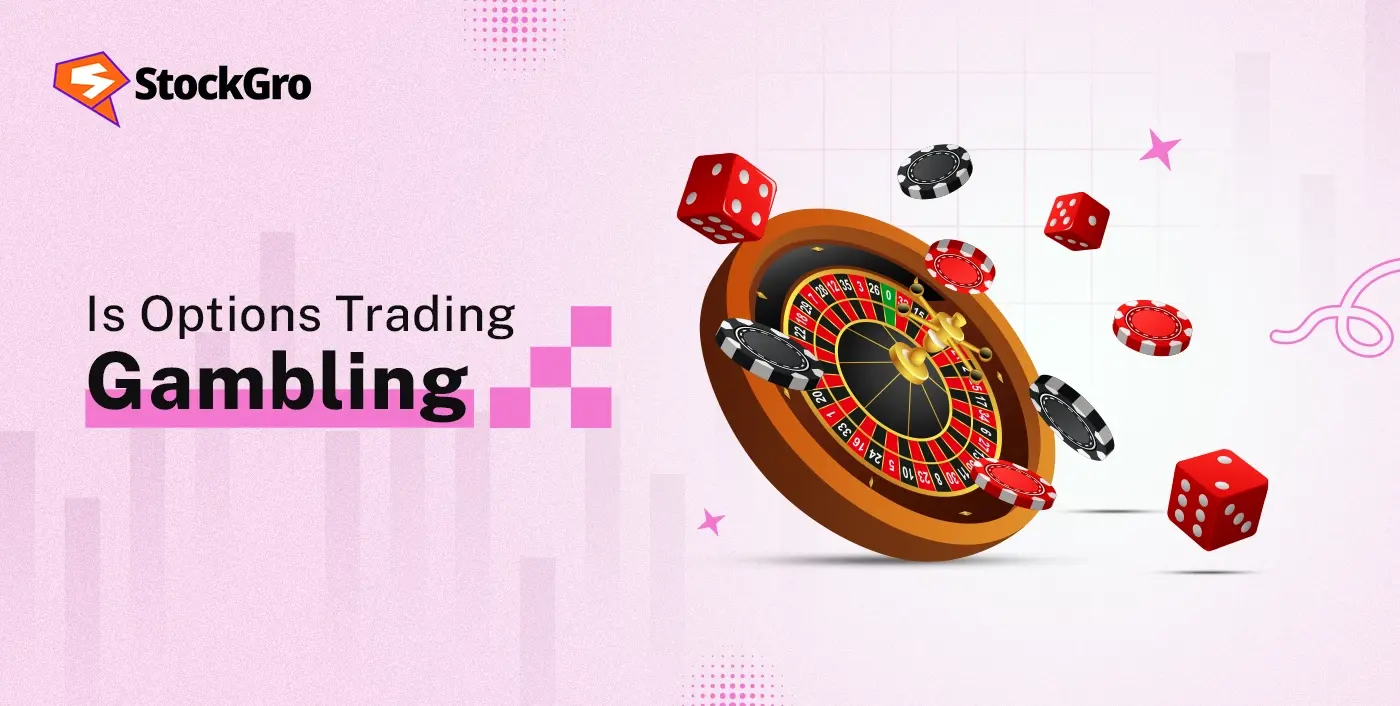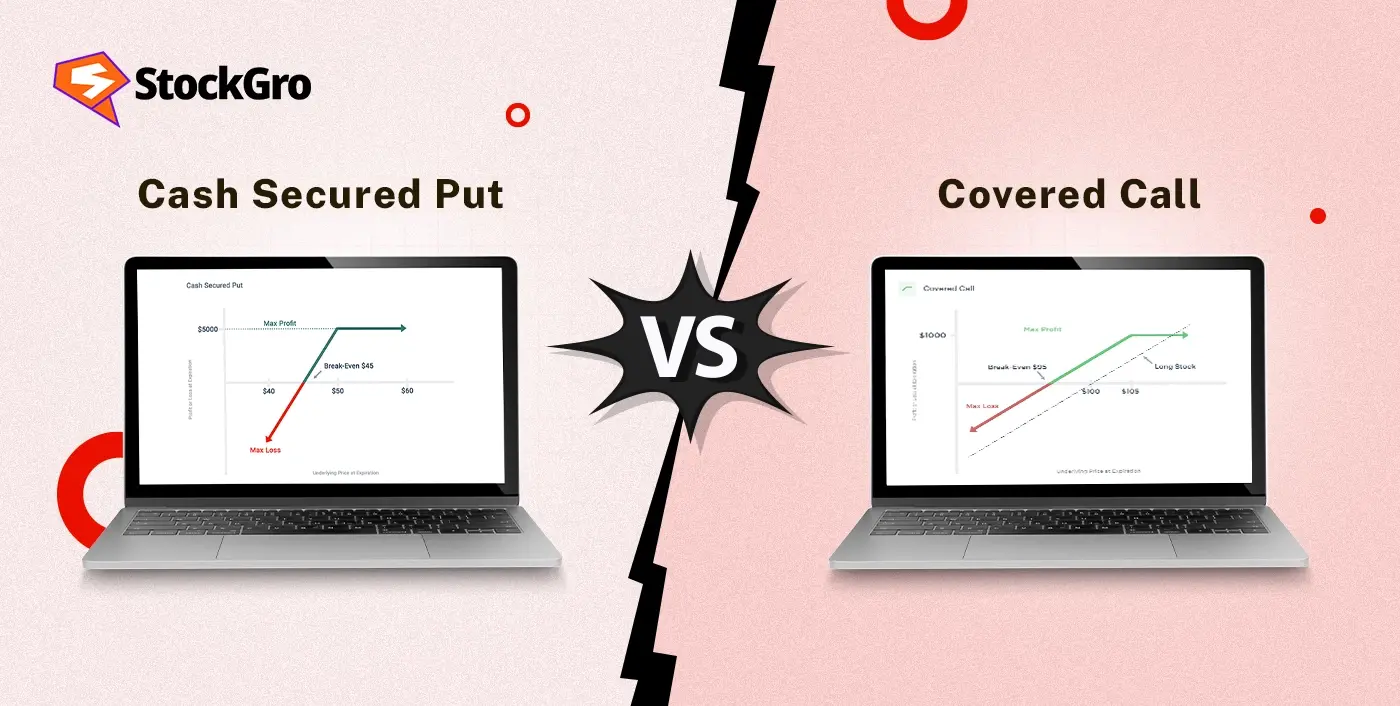
Options trading often divides opinion. Some call it a tool for smart risk-taking. Others dismiss it as a bet on short-term moves. There is a reason for both points of view. Options might be used carelessly, but they can also be planned, measured, and part of a bigger plan.
Let’s look at the facts, the new rules in India, and some blunders that people make. By the end, you will have a grounded answer.
Is Options Trading Gambling?
NO, Options trading is not a gambling. It can resemble gambling due to high risks but is legitimate with a solid strategy and risk management. An option is a contract. You have the option to purchase or sell a stock or index at a set price before a particular date, but you don’t have an obligation to.
You don’t buy the stock itself. You buy the right to act on it. The amount you pay for this right is called the premium.
There are two common types:
- Call option: Useful if you expect prices to go up.
- Put option: Useful if you expect prices to go down.
Now comparing option trading with gambling. Gambling is usually blind luck. Dice rolls, lottery tickets, slot machines, they have no room for detailed planning.
Recent data from SEBI demonstrates that trading options can be very risky for people who don’t know what they’re doing. Between FY22 and FY24, around 93% of individual F&O traders lost money, with total losses of more than ₹1.81 lakh crore.
Just 7.2% made money, and only 1% made more than ₹1 lakh after paying their fees. This doesn’t mean that options are gambling; it merely shows how crucial it is to have a plan, discipline, and understanding to prevent losing a lot of money.
In short, options trading is not designed to be a game of chance. But if you don’t do your research, plan ahead, or keep an eye on your risks, it can become like gambling.
Why Some People Think Options Trading is Gambling
It’s easy to see why people mix the two up:
- You can win or lose money very quickly. Some options trades are over in hours or even minutes.
- There are wild anecdotes and screenshots on social media that show both huge gains and huge losses.
- A lot of people rush in because a friend or a group told them to, without studying the basics first.
- There is an element of excitement. Fast-paced trading gets the blood flowing, just like wagering on sports.
- Some skip the research and rely on wild guesses or “secret tips” without understanding what they’re doing.
Doesn’t sound great, right? That’s why options trading gets its gambling reputation.
How Options Trading is Different from Gambling
Zoom out a little, and you will spot some clear differences:
- You can actually learn to get better at options trading. With gambling, there’s not much you can do.
- Stop-loss, position sizing, and backup plans are all strategies that successful traders employ to manage risk. People who gamble can’t control what happens with cards or dice.
- Trading is regulated in India. Brokers have to follow rules. Gambling often happens in shady corners, including online.
- In trading, you can plan ahead: studying market trends, setting goals, and sticking to your own strategy.
- Every trade is a chance to get smarter. The more you learn, the better your results can get.
| Options Trading | Gambling | |
| Can learn and improve | Yes | No |
| Use of skill or strategy | Yes | Rarely |
| Risk can be managed | Yes (stop-loss, limits) | Not really |
| Regulated environment | Yes | Sometimes, not always |
| Long-term success | Possible with discipline | Usually works against you |
How to Trade Options Responsibly
So, want to avoid the gambling trap? Here are a few real-world habits that help traders keep it together:
- Start by learning. Even ten minutes a day reading about options will pay off, promise.
- Begin with tiny trades. No need to throw in all your savings at once.
- Decide when you will walk away from a win or a loss before you make your move.
- Always use a stop-loss. This tool is your “emergency exit”: don’t trade without it and follow this principle strictly.
- Try demo or practice accounts. It’s a smart way to see what works before touching your own cash.
- Keep your cool. If you’re terrified, angry, excited, or too emotional, close the app and come back later.
- Take advice with a pinch of salt. There is a lot of noise on social media. What works for one individual might not work for you.
- Don’t put anything at risk that you can’t afford to lose. Never.
- Stick with brokers you can trust and who are regulated. If anything appears suspicious, it probably is.
There are a lot of free video lectures and workshops online that can help you get started and stay on track.
Common Mistakes That Make Options Trading Risky
How does smart trading slip into gambling? Usually from these classic mistakes:
- Not learning the basics at all; jumping in blind.
- Following hot tips and “trends” without understanding them.
- Risking a huge percentage of your money on one or two trades instead of spreading it around.
- Refusing to cut your losses, hoping you will win it all back.
- Letting Instagram, Twitter, or message groups make decisions for you.
- Trading on sketchy, unregulated apps.
Avoid these, and options trading looks a lot less like betting big on black.
Final Thoughts: Is Options Trading Right for You?
Options aren’t gambling by design. They become gambling when decisions ignore sizing, decay, and volatility. The research angle, the ability to define risk, and the regulatory guardrails separate options from games of chance.
That said, the data is sobering. If you want steady compounding with less time commitment, long-term equity or fund investing may suit you better. If you still prefer options, treat them as a skill. Start small, employ frameworks with clear risks, follow a written strategy, and keep track of your results like a pro.
When used correctly, options may protect a portfolio, make money, or show your opinions with little risk. Used loosely, they drain capital. The instrument isn’t the gamble, the approach is.
FAQs
No, trading options is not the same as gambling. Options trading is based on research, analysis, and strategy, while gambling is based on chance. In India, SEBI regulates it, which means it follows all the rules and laws about money.
Most traders lose money because they don’t follow the rules or don’t know what they are doing. They don’t think about hazards or short-term rewards, or they borrow too much money. SEBI’s data shows over 90% of retail F&O traders lose, mainly due to poor strategies and high costs.
Stock trading is not gambling if done with research and planning. Before making a purchase, investors research the companies, their earnings, and their industry. But if someone buys or sells stocks without thinking about it or keeping an eye on their risk, it could turn into gambling.
If you start small, set stop-loss limits, and don’t execute deals you don’t understand, you can trade options securely. Learn how to lower your risk with things like spreads, and don’t put in money you can’t afford to lose. Patience and discipline matter.
It’s more about talent than luck when you trade options. To be successful, you need to understand how markets work, establish plans, and keep an eye on hazards. You might get lucky with one or two deals, but the only way to generate money over time is to learn and practise.

